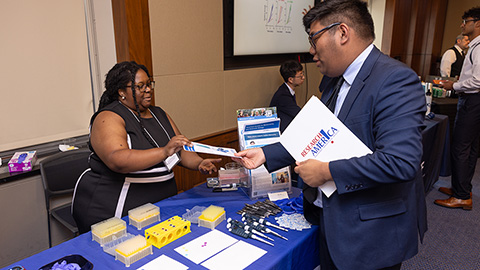ASBMB calls for 10% budget increase for NIGMS
The American Society for Biochemistry and Molecular Biology submitted testimony to the U.S. House Appropriations Committee on March 22 outlining its recommended budgets for major scientific funding agencies. Notably, the society requested a significant 10% increase in the budget for the National Institute of General Medical Sciences, which is part of the National Institutes of Health.
“The ASBMB has a longstanding history of advocating for NIGMS and its researchers, and the majority of our members are funded by and rely on NIGMS to advance their research,” Sarina Neote, public affairs director of the ASBMB, said. “The rising cost of science has made research difficult for our members and all scientists. Therefore, appropriators must not only adjust the NIH budgets to keep up with inflation but also invest in the scientists leading the way in areas like biotechnology, biophysics and molecular biology who have a home in NIGMS and NIGMS-funded labs.”
According to the ASBMB testimony, “The NIGMS is the largest funder of fundamental biomedical research, as well as biomedical research training programs to support the bioeconomy and its workforce.” In fact, NIGMS awards more than 11% of NIH research grants. However, NIGMS has been historically underfunded, and its budget usually represents only 6% of the total NIH budget. Over the past decade, the NIGMS budget has increased only 21%, whereas other institutes such as the National Institute of Allergy and Infectious Diseases have received more than a 40% increase. A 10% boost for NIGMS, Neote, said is modest in comparison.
The NIGMS is an established leader in funding excellent, innovative scientific researchers and has supported 60% of NIH-funded Nobel laureates. In addition, the NIGMS is a leading institute funding biotechnology and bioengineering research, which is one of President Joe Biden’s priorities as evidenced by his recent executive order “Advancing Biotechnology and Biomanufacturing Innovation for a Sustainable, Safe and Secure American Bioeconomy.”
In addition, the NIGMS awards the most (more than 25%) NIH diversity supplements across the 32 centers and institutes at the NIH. Going by NIH’s recent requests for information, the funder intends to make diversity, equity, accessibility and inclusion a priority, and NIGMS is leading the way.
The ASBMB also recently released a statement on Biden’s budget request. In it, the society expressed support for Biden’s proposed increases for the National Science Foundation and Department of Energy budgets. However, the society strongly opposed Biden’s NIH funding request, which proposed a minute increase of 1.7% for all NIH funding, specifically citing its negative impact on NIGMS.
The society recommended:
-
$3.52 billion for the NIH NIGMS
-
$8.9 billion for the Office of Science at the DOE
-
$12 billion for the NSF
In light of the rising cost of scientific research, the society called Biden’s NIH budget request “disappointing,” adding that “under Biden’s budget, the NIGMS would have to reduce funding for research project grants to offset inflation. This means scientists will have to abandon their projects. The U.S. research enterprise needs reliable, sustained investments in scientific funding, and Biden’s proposed budget for NIH falls short.”
ASBMB's other appropriations asks this year are an increase in the DOE Office of Science budget to support research in clean energy, climate change, emerging technologies and more. The society’s recommendation is similar to Biden’s proposed 13.6% increase, which will fund biological and environmental research.
In addition, the ASBMB showed support for continued funding for NSF that specifically bolsters the CHIPS and Science Act, which it said will “re-energize scientific research and training supported by the NSF” and “ensure the U.S. remains a global leader in innovation.” Its recommendation aligned with the 18.61% increase in Biden’s proposed budget.
Enjoy reading ASBMB Today?
Become a member to receive the print edition four times a year and the digital edition monthly.
Learn moreGet the latest from ASBMB Today
Enter your email address, and we’ll send you a weekly email with recent articles, interviews and more.
Latest in Policy
Policy highlights or most popular articles

Embrace your neurodivergence and flourish in college
This guide offers practical advice on setting yourself up for success — learn how to leverage campus resources, work with professors and embrace your strengths.

ASBMB honors Lawrence Tabak with public service award
He will deliver prerecorded remarks at the 2025 ASBMB Annual Meeting in Chicago.

Summer internships in an unpredictable funding environment
With the National Institutes of Health and other institutions canceling summer programs, many students are left scrambling for alternatives. If your program has been canceled or delayed, consider applying for other opportunities or taking a course.

Black excellence in biotech: Shaping the future of an industry
This Black History Month, we highlight the impact of DEI initiatives, trailblazing scientists and industry leaders working to create a more inclusive and scientific community. Discover how you can be part of the movement.

ASBMB releases statement on sustaining U.S. scientific leadership
The society encourages the executive and legislative branches of the U.S. government to continue their support of the nation’s leadership in science.

ASBMB and advocacy: What we accomplished in 2024
PAAC members met with policymakers to advocate for basic scientific research, connected some fellow members with funding opportunities and trained others to advocate for science.

